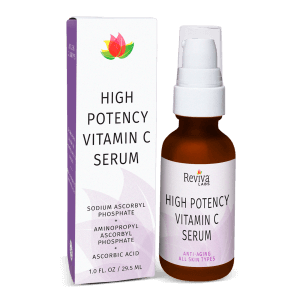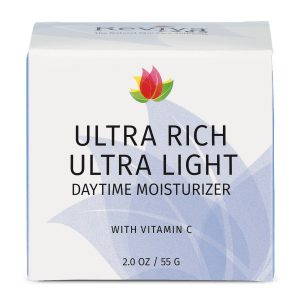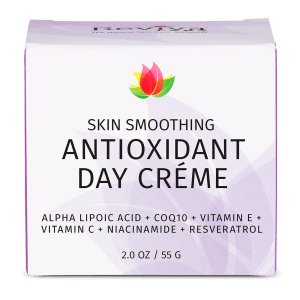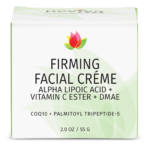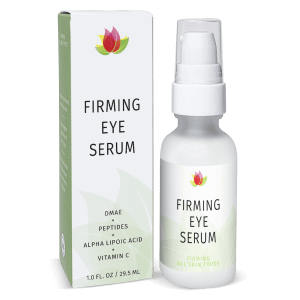Ingredients, Natural, Reviva Labs, Skin Care
How Vitamin C Transforms Your Skin
The buzz around vitamin C isn’t just hype—it’s supported by decades of dermatological research and proven clinical results. As one of the most celebrated ingredients in skincare, vitamin C does more than just brighten. It helps revive tired skin, reduce visible signs of damage, and lay the groundwork for a smoother, firmer, more even-toned complexion. But not all vitamin C is created equal, and using the right formulation is key.
Let’s explore how this powerhouse nutrient transforms your skin and how to choose the right version for your needs.
A Skin-Changing Antioxidant with Real Results
What sets vitamin C apart in the skincare world is its versatility and depth of benefits. It’s a potent antioxidant that neutralizes free radicals—the unstable molecules that contribute to premature aging, dullness, and skin damage from pollution and sun exposure. More importantly, vitamin C helps jumpstart the skin’s natural repair processes.
Clinical studies consistently show that topical vitamin C can significantly improve the appearance of fine lines and wrinkles, smooth texture, and reduce uneven pigmentation. It also supports collagen production, which gives the skin its structure and bounce. In a double-blind study published in the Journal of Clinical and Aesthetic Dermatology, a 10% vitamin C serum applied daily over 12 weeks improved skin wrinkling, tone, and overall brightness in over 70% of participants.
That’s transformation backed by science.
Brightening Tone and Blurring Spots
Perhaps the most immediate effect people notice when they start using vitamin C is the radiance. Dull, uneven skin becomes visibly brighter—often within just a few weeks of consistent use. That glow isn’t a trick of the light; it’s the result of vitamin C’s role in reducing melanin production. Melanin is the pigment responsible for dark spots, post-acne marks, and sun discoloration.
By interrupting the enzymatic process that leads to melanin formation, vitamin C helps fade existing discoloration and discourages new spots from forming. Unlike harsh chemical lighteners, it does this gently making it safe for most skin types when properly formulated.
Collagen Support That Doesn’t Require Needles
As we age, the body’s collagen production naturally declines, leading to sagging skin, fine lines, and crepey texture. Vitamin C is one of the only topical ingredients scientifically proven to support new collagen synthesis. By stimulating the fibroblasts that build collagen fibers, vitamin C helps reinforce the skin’s structural integrity. The result? Firmer skin with better elasticity and a more youthful surface.
Collagen support doesn’t happen overnight—but long-term use of vitamin C, especially when combined with complementary ingredients like DMAE, CoQ10, and hyaluronic acid, delivers measurable improvements over time.
Protection From What You Can’t See
While many people think of sunscreen as their main protection against the environment, vitamin C is its perfect partner. UV rays, pollution, smoke, and even stress all contribute to oxidative stress that breaks down skin cells from the inside. Vitamin C works like an antioxidant shield, neutralizing these aggressors before they cause visible damage.
Unlike sunscreens that block or absorb rays, vitamin C works at the cellular level—defending skin from the inside out. It’s not a replacement for SPF, but it’s a powerful second line of defense that enhances your skin’s resilience.

The Different Forms of Vitamin C in Skincare
Vitamin C isn’t just one thing. It exists in many forms, and each type has unique strengths. Here’s a breakdown of the most common versions you’ll find in skincare—and what to watch out for.
L-Ascorbic Acid
This is the purest form of vitamin C and the one most extensively studied. It’s water-soluble and delivers fast results—especially when used in concentrations of 10% to 20%. It’s highly effective at brightening skin, reducing pigmentation, and boosting collagen. However, it’s notoriously unstable, degrading quickly when exposed to air, light, or heat.
Pros: Fast-acting, clinically proven, collagen-boosting
Cons: Can oxidize quickly, may cause irritation for sensitive skin, especially at high strengths
Sodium Ascorbyl Phosphate
This gentler, water-soluble derivative is less potent than L-ascorbic acid but far more stable. It’s ideal for those with sensitive or blemish-prone skin, as it’s less acidic and less likely to cause irritation. It still brightens and protects, though results may take longer to show.
Pros: Gentle on skin, stable in formulations, suitable for sensitive skin
Cons: Less immediate effect on dark spots and collagen than pure vitamin C
Magnesium Ascorbyl Phosphate
Often used in creams and lotions, this fat-soluble derivative penetrates deeper into the skin’s lipid barrier. It’s well-tolerated and offers anti-inflammatory benefits alongside its antioxidant properties. This makes it a favorite for calming redness while brightening uneven tone.
Pros: Anti-inflammatory, excellent for dry or inflamed skin
Cons: Works slowly, may be less effective for deep hyperpigmentation
Aminopropyl Ascorbyl Phosphate
A newer vitamin C derivative found in more advanced serums, this version is both stable and highly bioavailable. It penetrates well, supports collagen synthesis, and evens skin tone effectively making it an ideal balance between strength and gentleness.
Pros: Stable, penetrates skin effectively, collagen support
Cons: Can be more expensive, not as widely available
How to Choose the Right Vitamin C for Your Skin Type
Because skin needs vary widely, matching the type of vitamin C to your complexion makes a big difference.
If your skin is oily or prone to breakouts, opt for a stable, non-comedogenic formula like Sodium Ascorbyl Phosphate. This form helps minimize inflammation and is less likely to clog pores. Those with dry or mature skin might benefit more from cream-based formulas containing Magnesium Ascorbyl Phosphate or Aminopropyl Ascorbyl Phosphate, which provide hydration along with antioxidant support.
For more resilient skin types, a serum with L-Ascorbic Acid in the 10–15% range offers fast, noticeable improvement in brightness and texture—just be sure to pair it with SPF, as active vitamin C can make skin more UV sensitive.
Using Vitamin C Effectively in Your Routine
To get the full benefits of vitamin C, consistency is critical. It should be applied once or twice daily on clean skin, ideally before moisturizers or sunscreen. It pairs beautifully with ingredients like hyaluronic acid (for hydration), ferulic acid (for stabilization), and niacinamide (for added brightening). However, avoid using it at the same time as strong exfoliants like AHAs or retinol unless directed by a professional.
The Reviva Labs High Potency Vitamin C Serum is a strong example of how to do vitamin C right. It uses a blend of three vitamin C derivatives—Aminopropyl Ascorbyl Phosphate, Ascorbic Acid, and Sodium Ascorbyl Phosphate—combined with hyaluronic acid and botanical extracts to deliver both immediate and long-term benefits. This formulation supports collagen, reduces discoloration, and helps protect against environmental stressors without the harshness often found in traditional acid-based serums.
A Radiant Complexion Is Closer Than You Think
Adding vitamin C to your skincare routine isn’t just about treating a specific issue—it’s about futureproofing your skin. From the first few applications, skin begins to appear smoother and more luminous. Over weeks and months, dark spots fade, fine lines soften, and your skin tone evens out.
You don’t need an expensive facial to see results. With the right vitamin C serum, transformation can happen right at your bathroom sink.
Whether you’re looking to reverse past damage or build a stronger defense for tomorrow, vitamin C offers a solution that’s as smart as it is effective.







